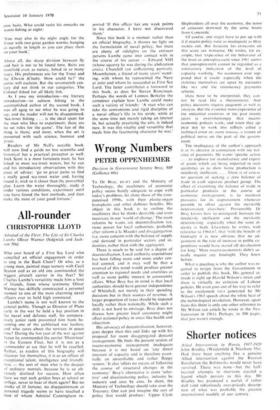Wrong Numbers
PETER OPPENHEIMER
Decision in Government Jeremy Bray, MP (Gollancz 60s)
To Dr Bray, ex-ici and the Ministry of Technology, the machinery of economic policy seems barely adequate to cope with today's problems, let alone those of the com- puterised 1990s, with their plastic-organ transplants and other dubious benefits. His object in this book is to outline the machinery that he thinks desirable and even necessary in our 'world of change.' The main reforms he wants are decentralisation (i.e. more power for local authorities, probably after reform a la Maude) and disaggregation (i.e. more concern with the balance of supply and demand in particular sectors and in- dustries, rather than with the aggregate).
There is much to be said for a degree of decentralisation. Local authority expenditure has been falling more and more under cen- tral control, and it may well be that a reversal of this trend would produce greater attention to regional needs and amenities as well as more public interest in community affairs. What Bray has in mind is that local authorities should have greater independence of Whitehall, not merely in their spending decisions but in their sources of revenue. A larger proportion of taxes should be imposed locally rather than nationally. While such a shift is not hard to envisage, Bray does not discuss how greater local autonomy might affect national policy in areas like health and education.
His advocacy of decentralisation, however, goes deeper than this and links up with his proposal for more disaggregated demand management. He finds the present system of macro-economic management inadequate because it is not based on 'any direct measure of capacity and is therefore essen- tially an unverifiable and rather floppy system.' It also 'offers no means of following the course of structural changes in the economy.' Bray's alternative is more 'selec- tive' and discriminating policy, industry by industry and area by area. In short, the Ministry of Technology should take over the Treasury. One can just imagine the sort of policy that would produce: Upper Clyde
Shipbuilders all over the economy, the noise of criticism drowned by the sonic boom from Concorde.
Of course, one might have to put up with it if macro-policy were as inadequate as Bray makes out. But basically his criticisms on
this score are nonsense. He writes, for ex- ample, mat *experience of the behaviour of the level of unemployment since 1967 snows that unemployment cannot be regarded as a satisfactory indication of the level of capacity working: No economist ever sup- posed that it could—especially when the statistics themselves are upset by measures like SET and the redundancy payments scheme.
Data have to be interpreted; they can- not be read like a thermometer. And policy decisions require juugment as well as analysis. But the evidence from experience of the industrial countries in the past twenty years is overwhelmingly that macro- economic policies work; and when they ap- pear not to work this reflects either a technical error or, more usually, a failure of political nerve on the part of the govern- ment.
The inadequacy of the author's approach is at its clearest in connection with the bal- ance of payments. He wants 'specific action . . . to improve tne manufacture and export of goods which are being imported in such quantities as to show home production is needlessly inefficient.. . . 1 here is of course no question of seeking a zero balance of trade in each separate product group. The effect of examining the balance of trade in particular products in the course of economic management, is to maintain pressures for its improvement whenever possible to Whet against the inevitable deterioration elsevv here. Presumably Dr Bray knows how to distinguish between the needlessly inefficient and the inevitably deteriorating --especially when the same in- dustry is both. Elsewhere he writes, with reference to 1964-67, that 'with the benefit of hindsight it is now obvious that no ad- justment in the rate of increase in public ex- penditure would have staved off devaluation for long.' Mere macro-economists didn't ac- tually require any hindsight. They knew before.
What is puzzling is why the author was re- quired to resign from the Government in order to publish this book. His general at- titude is right up Harold Wilson's street and there is virtually no criticism of Labour policies. He even goes out of his way to refer to the excitement (sic) generated by Mr Wilson's 1963 speech about the white heat of the technological revolution. However, apart from this there is only one other reference to Mr Wilson (an article he wrote in the New Statesman in 1961). Perhaps, in 300 pages, that just wasn't enough.


































 Previous page
Previous page